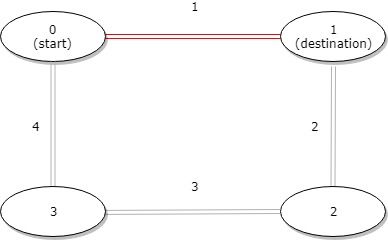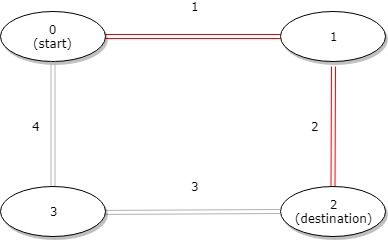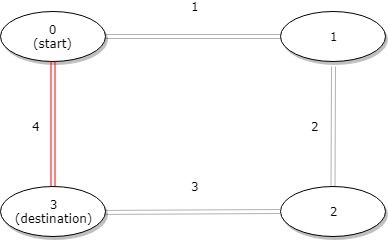| comments | difficulty | edit_url | rating | source | tags | |
|---|---|---|---|---|---|---|
true |
简单 |
1234 |
第 153 场周赛 Q1 |
|
环形公交路线上有 n 个站,按次序从 0 到 n - 1 进行编号。我们已知每一对相邻公交站之间的距离,distance[i] 表示编号为 i 的车站和编号为 (i + 1) % n 的车站之间的距离。
环线上的公交车都可以按顺时针和逆时针的方向行驶。
返回乘客从出发点 start 到目的地 destination 之间的最短距离。
示例 1:
输入:distance = [1,2,3,4], start = 0, destination = 1 输出:1 解释:公交站 0 和 1 之间的距离是 1 或 9,最小值是 1。
示例 2:
输入:distance = [1,2,3,4], start = 0, destination = 2 输出:3 解释:公交站 0 和 2 之间的距离是 3 或 7,最小值是 3。
示例 3:
输入:distance = [1,2,3,4], start = 0, destination = 3 输出:4 解释:公交站 0 和 3 之间的距离是 6 或 4,最小值是 4。
提示:
1 <= n <= 10^4distance.length == n0 <= start, destination < n0 <= distance[i] <= 10^4
我们可以先统计出公交车的总行驶距离
时间复杂度
class Solution:
def distanceBetweenBusStops(
self, distance: List[int], start: int, destination: int
) -> int:
s = sum(distance)
t, n = 0, len(distance)
while start != destination:
t += distance[start]
start = (start + 1) % n
return min(t, s - t)class Solution {
public int distanceBetweenBusStops(int[] distance, int start, int destination) {
int s = Arrays.stream(distance).sum();
int n = distance.length, t = 0;
while (start != destination) {
t += distance[start];
start = (start + 1) % n;
}
return Math.min(t, s - t);
}
}class Solution {
public:
int distanceBetweenBusStops(vector<int>& distance, int start, int destination) {
int s = accumulate(distance.begin(), distance.end(), 0);
int t = 0, n = distance.size();
while (start != destination) {
t += distance[start];
start = (start + 1) % n;
}
return min(t, s - t);
}
};func distanceBetweenBusStops(distance []int, start int, destination int) int {
s, t := 0, 0
for _, x := range distance {
s += x
}
for start != destination {
t += distance[start]
start = (start + 1) % len(distance)
}
return min(t, s-t)
}function distanceBetweenBusStops(distance: number[], start: number, destination: number): number {
const s = distance.reduce((a, b) => a + b, 0);
const n = distance.length;
let t = 0;
while (start !== destination) {
t += distance[start];
start = (start + 1) % n;
}
return Math.min(t, s - t);
}impl Solution {
pub fn distance_between_bus_stops(distance: Vec<i32>, start: i32, destination: i32) -> i32 {
let s: i32 = distance.iter().sum();
let mut t = 0;
let n = distance.len();
let mut start = start as usize;
let destination = destination as usize;
while start != destination {
t += distance[start];
start = (start + 1) % n;
}
t.min(s - t)
}
}/**
* @param {number[]} distance
* @param {number} start
* @param {number} destination
* @return {number}
*/
var distanceBetweenBusStops = function (distance, start, destination) {
const s = distance.reduce((a, b) => a + b, 0);
const n = distance.length;
let t = 0;
while (start !== destination) {
t += distance[start];
start = (start + 1) % n;
}
return Math.min(t, s - t);
};

